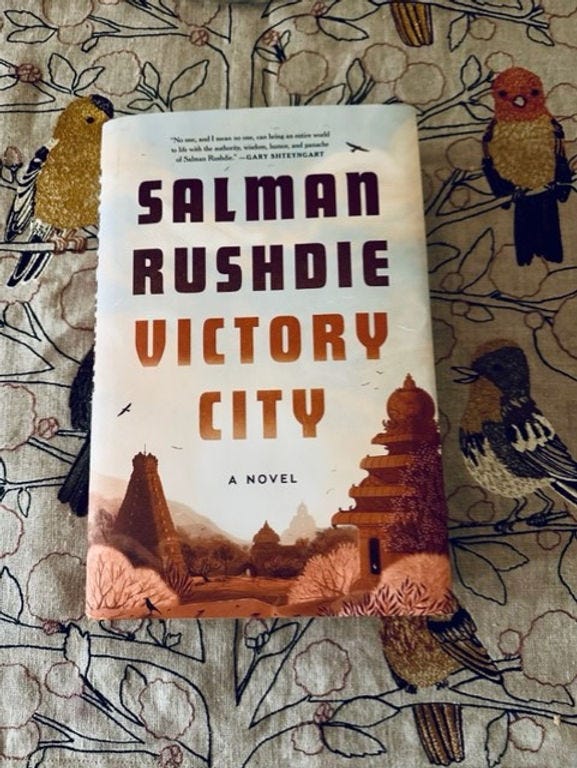Review of VICTORY CITY
An illuminating and timely journey through Rushdie's looking glass ...
This was a victorious reading experience in important ways. It was the FIRST Rushdie novel I have finished. This is an embarrassing thing to admit given his stature both as a writer and an outspoken artist. His life story is irredeemably mixed with his writing for good and for bad. This was part of my resistance to his work. I felt like I was choosing to spend a couple weeks with a very large (albeit very courageous) ego. Given his fabulist tendencies, his larger-than-life story made his presence too immediate for me to enjoy his work. It didn’t help that I simply could not get a grip on his widely praised masterpiece, Midnight Children. Much of his work is long and its fantasy elements too often left me cold. I do not know why I chose to finally tackle this book. The reviews were tempting, and the length was attractive. But the real reason I jumped in was that I felt I was being dismissive. I have lived within a canon of traditional writing that Rushdie’s imaginative style does not easily square with. It was time to take a chance. I almost stopped after the first thirty pages but was soon off to the races. It proved to be a very satisfying and instructive victory over my own long-established biases.
The real “victory” is the book itself. Rushdie’s imaginative approach to a fairy tale version of an actual history is startling. The history is that of an empire in Southern India. Timelines are fluid, characters are entirely fictional, places are often not, and events follow a historical fault line throughout. The central character is an extraordinary woman who lives over 200 years and makes Wonder Woman seem like just who she is, a comic book figure. Most of the admirable people in the story are women. It is an ode to a feminine ideal wrapped within the reality of empire. Because its fabulist narrative unhinges it from its historical roots, it becomes a mirror with which to examine our own world and history itself. It is rich stuff. I felt like I was introduced to a new cuisine whose otherness greatly expanded my sense of the world.
Finally, despite my own issues with his celebrity status, the third victory is Rushdie’s himself. Recently attacked by an Islamic assassin, always having to wake to the threat of violence, the fact that he can write a book like Victory City says everything about the role of art in our unhinged world. He writes directly to the dark forces that want him dead. His message goes beyond Iran and the mullahs. It is a fable aimed at the heart of the Putin worlds both within and without. Worlds where words and art do not matter. In the end Rushdie says we are only left with words. They are our truths. In his case, they are words shining within the vermiculate patterns of his imagination.
VICTORY CITY
Salman Rushdie
2023 352 pages


